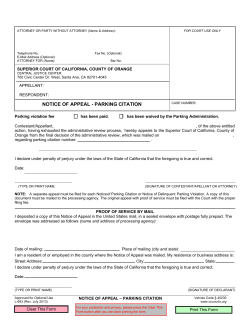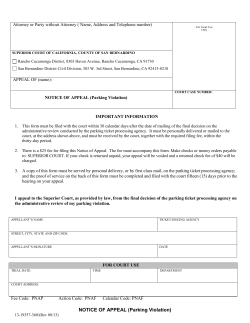
LiabiLity for Car Park MaintenanCe ParkinG PraCtiCe noteS
PARKING PRACTICE NOTES Revised November 2011 Liability for Car Park Maintenance BRITISH PARKING ASSOCIATION І PARKING PRACTICE NOTES 30 Contents Legislation/legal obligations .................................... 4 Duty of the owner/operator /employer ........................................................................................................................................... 5 Duty of the car park manager ................................. 6 Discharging the legal obligations .......... 7 Insurance ....................................................................................................................................... 7 Park Mark .......................................................................................................................................... 7 BPA Master Plan Objective ........................................................... 7 References ....................................................................................................................................... 8 British Parking Association Stuart House 41-43 Perrymount Road Haywards Heath West Sussex RH16 3BN Phone: +44 (0) 1444 447300 Fax: +44 (0) 1444 454105 info@britishparking.co.uk www.britishparking.co.uk © British Parking Association 2011 2 BRITISH PARKING ASSOCIATION І PARKING PRACTICE NOTES 30 Introduction Looking after a car park can be an onerous task but if properly undertaken it can bring financial rewards and reduce the risk of unforeseen claims. Car parks are dynamic buildings with cars and people in motion and from time to time they interact in unpredictable ways vehicles run into the building causing damage to the structure and to the occupants of the vehicle, they occasionally collide with pedestrians resulting in personal injury, people slip, trip and fall from poorly protected edges, pieces of concrete, masonry, and coping stones become dislodged and cause injury to persons below. Parking equipment is a further source for potential claims for example motorists run into rising bollard and rising step barriers, and pedestrians indadvertedly cross below lifting arm barriers when they are about to close.The owner/ operator has little control over these kinds of events. Likewise where personal injury is involved the outcome of a claim is totally unpredictable. A small incident can lead to expensive legal action and a large payout not to mention the adverse affect on the reputation of the owner/operator. Preparing and implementing a Life-care plan enables the owner/ operator to plan and set aside sufficient funds to maintain a car park in a safe condition and demonstrate that the legal obligations are being taken seriously. 3 BRITISH PARKING ASSOCIATION І PARKING PRACTICE NOTES 30 Legislation/legal obligations Every owner/ operator has a duty of care to maintain the building in a safe condition for those persons in or about it whether lawfully or otherwise. This is a requirement of the Occupiers’ Liability Act 1957 and the Occupiers’ Liability Act 1984. If the car park is subject to work place activities for example cleaning, maintenance, ticket issue or inspection it falls under the Health and Safety at Work etc Act 1974 together with the Workplace (Health, Safety and Welfare) Regulations 1992. The Health and Safety Executive Inspectors have powers to issue Improvement Notices and Prohibition Notices and have any unsafe areas up-graded to comply with current Building Regulations. This can include such items as non-compliant barriers, uneven surfaces, unsecured parts of the structure, sub-standard lighting to name but a few. New build construction and significant repairs to existing structures fall under the Construction (Design and Management) Regulations 2007 and are notifyable to the Health and Safety Executive. Under these regulations the client, which in the case of a car park can be the owner/ operator, has a duty to ensure that there are adequate resources to safely execute the works on site. This includes not only sufficient experienced and trained manpower but also adequate time and financial resources to coordinate and manage the works. Should a car park fall into disrepair and impose a risk to those persons using it, the Local Authority is empowered under sections 77 and 78 of the Building Act 1984 to close and demolish the facility or have it repaired to a safe standard and recover the cost from the owner/ operator. Should an enforcement notice be issued it is likely that a formal enquiry will be conducted to determine how the structure came to be in this condition and whether the owner/ operator had done everything that was reasonably practicable to prevent this from happening. If an incident is sufficiently severe to result in personal injury or loss of life it will lead to an investigation by the Health and Safety Executive and may result in prosecution and heavy fines. In the unfortunate circumstances of significant loss of life arising from a breach of statutory duty those persons found responsible could face imprisonment under the Corporate Manslaughter and Corporate Homicide Act 2007. Where the owner or operator operates a parking facility on leased land, members should bear in mind that the lease will likely impose separate and independent reporting and maintenance requirements between the owner or operator and the party granting the lease. Members should ensure that they familiarise themselves with any such requirements which may be particular to their circumstances, to avoid being in breach of lease obligations. 4 BRITISH PARKING ASSOCIATION І PARKING PRACTICE NOTES 30 Duty of the owner/ operator/employer Every owner/ operator/ employer has a duty to comply with the above legal obligations for safely operating and maintaining a multi-storey car park. There are no exceptions. The task of inspecting and maintaining a car park can be delegated to an employee or to a third party by outsourcing but in doing so the extent of the responsibility must be defined which in the case of an employee can be by way of a job specification. In the case of outsourced services the responsibilities should be scheduled in the employers requirements. Although specific responsibilities can be delegated, the owner/ operator/ employer has overall responsibility for the car park and has a duty to have a proper framework with procedures in place for resourcing, executing, monitoring and auditing those procedures. The owner/ operator/ employer is also responsible for assessing and managing the risks associated with operating a car park. Should there be a breach of statutory duty it is the responsibility of the owner/ operator/ employer to demonstrate that everything has been done that was reasonably practical at that time - lack of funds or resources is not a valid excuse. Needless to say this is a time consuming exercise which can be expensive and very disruptive to operations. Preparing and implementing a Life-care plan enables the owner/ operator/ employer to plan and set aside sufficient funds to maintain a car park in a safe condition and to demonstrate that the legal obligations are being taken seriously. Duty of the car park manager The parking manager often has responsibility for the day to day operation of a car park including its maintenance and upkeep. He/ she is therefore required to keep abreast of current practices and procedures and how legislation relates to his/ her responsibilities and those of the employer. This is a very onerous task as the parking manager has to make the employer aware of any risks and costs involved with operating the car park regardless of any financial constraints. Failure to do so can compromise his/ her legal position and can result in sharing the blame for an incident. Should there be a breach of statutory duty it may fall on the parking manager along with the employer to demonstrate that everything had been done at the time that was reasonably practical within each individual’s responsibility. In the case of an operating company the roles and responsibilities are often clearly defined in the company’s procedures along with the budgets for inspection and maintenance but in the case of a Local Authority the situation is more complex. No two Local Authorities are the same and for a parking manager it can vary from having control over the maintenance budget to having to bid for funding. Needless to say the latter is fraught with difficulties as without having sufficient funds in place to undertake an initial structural assessment it is impossible to prepare a properly informed case for funding. This dilemma is one of the major factors a parking manager has to face in maintaining a car park in a safe condition. 5 BRITISH PARKING ASSOCIATION І PARKING PRACTICE NOTES 30 Discharging the legal obligations Discharging the legal obligations is a relatively simple task and guidance is given within the Institution of Civil Engineers Recommendations for inspection, maintenance and management of car park structures. The recommendations describes the requirements routine inspections and daily surveillance, initial appraisal and condition survey, structural appraisal, repair and maintenance regimes and how these documents contribute to preparing costed options to optimise future maintenance and repair. Individually each document is of limited value but when combined they form the basis of a Life-care plan which sets out in a logical form the future maintenance requirements, how to prioritize the works in terms of time and cost taking into account the future life expectancy of the car park. Insurance Although insurance is readily available to cover normal everyday risks whilst a car park is in use, it will not cover neglect and failure to comply with statutory obligations. Insurance companies have the right to withdraw cover or raise premiums if they are being exposed to unnecessary risks. Having a Life-care plan in place is considered to be an acceptable way of limiting the exposure to risk and subsequent claims. 6 BRITISH PARKING ASSOCIATION І PARKING PRACTICE NOTES 30 Park Mark Structural safety and the appreciation of the benefit of having a Life-care plan is an integral part of the Safer Parking Scheme and the Guidelines for the Scheme contains important information which the Award holder should be aware of. BPA Master Plan Objective We want to see a greater emphasis on the need to ensure that parking structures are properly inspected and maintained. Owners and operators should be encouraged to have a financial mechanism in place to fund routine structural assessments, life-care planning and essential maintenance. The BPA is concerned that Britain’s many aging car parks are properly serviced and maintained. Funds should be made available by owners and operators to provide for regular safety and structural inspections which will identify defects and prompt repairs to minimise the risk of structural failure. This Parking Practice Note is useful in explaining what can be done in support of this objective. We hope those who manage car parks can use this information to work with those responsible for the maintenance and upkeep of the structure and those who control funding arrangements. 7 BRITISH PARKING ASSOCIATION І PARKING PRACTICE NOTES 30 References For further advice on inspecting and maintaining car park structures reference can be made to: PPN 6 Life-care Plans for Parking Structures PPN 17 Asset Management and Maintenance of Parking Structures “Safe and Sound” A guide to Life-care Plans for Park Mark™ award holders Institution of Civil Engineers Recommendations for the inspection, maintenance and management of car park structures – published by Thomas Telford in 2002 ISBN: 0 7277 3183 1 © British Parking Association 2011 With thanks to the author Chris Whapples. Whilst the BPA and the author have made every effort to check facts and statements in this note, no liability can be accepted for negligence or otherwise in relation to the contents of the note. Legislation and guidance are subject to change, and readers should seek appropriate up-to-date specialist advice relating to their circumstances. Any views expressed in this note are those of the author. 8
© Copyright 2025














